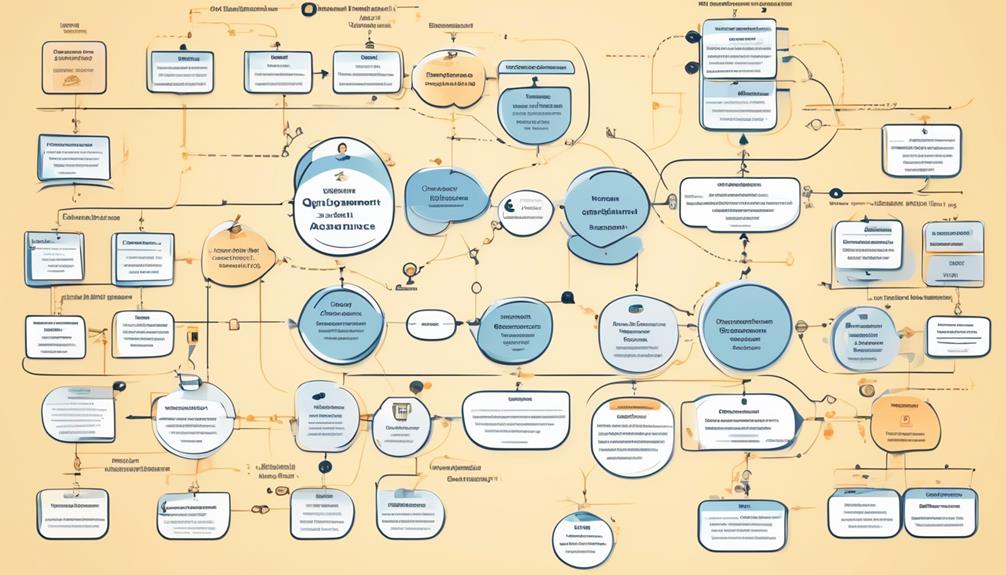In my time working in software development, I have come across an interesting statistic that underscores the importance of a quality assurance (QA) tester in a development team. Did you know that approximately 80% of the total costs in software development come from identifying and fixing errors?
This staggering figure underscores the critical role of QA testers in the software development process. But why exactly are they needed, and what value do they bring to the team?
Let's explore the multifaceted reasons behind the necessity of having a dedicated QA tester and the impact it has on the success of software projects.
Key Takeaways
- QA testing is crucial for ensuring the overall quality, functionality, and performance of software.
- QA testers play a pivotal role in optimizing the testing process efficiency and maximizing resource utilization.
- Accurate bug identification and resolution by QA testers contribute to improved software quality and customer satisfaction.
- QA testers are essential for enhancing product quality, reliability, and meeting user expectations.
Importance of QA Testing in Software Development
Quality Assurance testing in software development plays a crucial role in ensuring the overall quality, functionality, and performance of the software. As a QA tester, I understand the importance of integrating comprehensive testing throughout the software development process. Our team's dedication to quality assurance helps ensure that the end product meets the highest standards and exceeds user expectations.
By incorporating QA testing, we can identify and address potential issues early in the development process, preventing them from escalating into larger problems. This proactive approach not only enhances the overall quality of the product but also significantly reduces the likelihood of costly and time-consuming rework.
The role of a QA tester in a software development team is to ensure that the end product not only functions as intended but also delivers an exceptional user experience. Through rigorous testing techniques such as functional testing, regression testing, and performance testing, we can identify and mitigate risks, thereby guaranteeing a high-quality and reliable software product for our users.
In essence, the importance of QA testing can't be overstated, as it's a cornerstone in the process of delivering exceptional software.
Role of a Quality Assurance Tester

As a Quality Assurance Tester, I play a crucial role in ensuring the efficiency of the testing process, accuracy in identifying bugs, and overall improvement of product quality.
By focusing on process efficiency, I aim to streamline testing procedures and maximize the use of resources.
Additionally, my attention to bug identification accuracy contributes to the overall reliability and robustness of the software being developed.
Testing Process Efficiency
In the software development process, a quality assurance tester plays a pivotal role in optimizing testing process efficiency through meticulous test planning, proactive defect identification, and seamless collaboration with the development team. By ensuring that the testing process is efficient, QA testers contribute to the overall quality and functionality of the software. This is achieved through the development of a comprehensive test strategy, creation of detailed test cases, and proactive identification and resolution of defects. The table below highlights the key elements that contribute to the efficiency of the testing process.
| Key Elements of Testing Process Efficiency |
|---|
| Meticulous Test Planning |
| Proactive Defect Identification |
| Seamless Collaboration with Dev Team |
By focusing on these elements, QA testers enhance the testing process, ensuring that the software meets quality standards and performs optimally.
Your content here.
Bug Identification Accuracy
Playing a critical role in ensuring the accuracy of bug identification, a quality assurance tester meticulously scrutinizes and reports defects, seamlessly extending their contribution to the optimization of the testing process efficiency.
By creating and executing comprehensive test cases, dedicated quality assurance testers play a pivotal role in accurately identifying, reporting, and tracking defects in the software development pipeline. Their meticulous analysis of test results and collaboration with developers significantly enhance the overall software quality.
This meticulous work ensures that potential issues are identified and resolved early in the project, thereby contributing to the success of software projects. The QA tester's role in bug identification accuracy is integral to the software development team, ultimately ensuring that the software meets the highest standards of quality and reliability.
Product Quality Improvement
Contributing to the enhancement of product quality, a quality assurance tester meticulously evaluates software functionality and performance through comprehensive testing procedures.
The QA tester is essential in ensuring that the software meets quality standards and functions flawlessly.
Their crucial role in ensuring software quality assurance involves:
- Identifying and resolving defects: QA testers meticulously identify and document any issues, working closely with the development team to resolve them promptly.
- Enhancing the overall quality: Through rigorous testing, QA testers contribute to improved customer experience by ensuring high-quality software.
- Improved customer satisfaction: By conducting thorough testing procedures, QA testers play a vital role in delivering software that meets user expectations, ultimately leading to higher customer satisfaction.
Benefits of Having QA Testers

As a Quality Assurance Tester, I've found that one of the key benefits of having QA testers on a software development team is the efficient bug identification process.
This helps in ensuring that the product quality is improved before it reaches the end users, ultimately leading to higher customer satisfaction.
Additionally, having QA testers onboard facilitates faster release cycles, allowing for quicker updates and improvements to be made to the software.
Bug Identification Process
QA testers contribute significantly to the software development process by ensuring quality, reliability, and performance through the identification and reporting of defects for issue resolution.
The bug identification process involves:
- Thorough Testing: QA testers meticulously examine the software to identify and resolve any issues, ensuring that the product meets the highest quality standards.
- Utilization of Testing Tools and Automation: QA teams employ advanced testing tools and automation to facilitate comprehensive testing, enabling efficient bug identification and resolution.
- Collaboration with Development Teams: QA testers work closely with development teams to rectify any issues, ensuring that the software meets the desired specifications and functions optimally. This collaboration enhances the overall quality and reliability of the software, safeguarding the company's reputation.
Product Quality Improvement
Upon identifying and resolving defects in the bug identification process, the presence of QA testers on a software development team leads to substantial product quality improvement. QA testers meticulously create and execute test cases, ensuring that the software functions as intended. They also leverage test automation and performance testing tools to identify potential issues, enhancing the overall performance of the software. Additionally, their collaboration with developers results in a comprehensive approach to quality assurance, where attention to detail is paramount. This collaborative effort and attention to quality directly contribute to the delivery of high-quality software to end-users, ultimately elevating the user experience and satisfaction.
| Benefits of QA Testers on Software Development Team |
|---|
| – Thorough creation and execution of test cases |
| – Utilization of test automation and performance testing tools |
| – Collaboration with developers for comprehensive quality assurance |
Faster Release Cycles
How do QA testers contribute to expediting release cycles and ensuring product quality in software development?
- Early Defect Detection: QA testers play a crucial role in identifying and rectifying defects early in the development process, ensuring a smoother and faster release cycle.
- Automation Tools: Test management tools and (CI/CD) tools help automate the testing process, enabling QA testers to write and execute automated test scripts, thereby accelerating the testing and release process.
- Continuous Improvement: By providing valuable feedback and insights, QA testers contribute to constant improvement, leading to quicker iterations and releases.
With their expertise in various aspects of QA, including test management tools and automation frameworks, QA testers are indispensable for expediting release cycles and maintaining product quality.
QA Process and Methodologies

What key methodologies and processes are utilized in ensuring the quality and functionality of software through rigorous testing? Quality Assurance testers play a vital role in upholding software testing and quality through various methodologies and processes. As a dedicated QA tester, I am involved in writing test cases, performing manual testing, and collaborating with QA teams to ensure the highest standards of quality. The table below provides a concise overview of some of the key methodologies and processes used in QA testing.
| Methodologies | Description | Benefits |
|---|---|---|
| Functional Testing | Evaluates the system against functional requirements. | Identifies discrepancies between expected and actual outcomes. |
| Regression Testing | Verifies that recent code changes have not adversely affected existing features. | Prevents the reintroduction of previously resolved issues. |
| Performance Testing | Assesses the system's responsiveness, stability, and scalability. | Uncovers potential performance bottlenecks and optimizes system efficiency. |
Skills and Expertise of QA Testers

As a Quality Assurance tester, my role demands a combination of technical proficiency, strong analytical skills, attention to detail, problem-solving abilities, and effective communication skills to ensure the quality and functionality of software through rigorous testing.
My expertise includes:
- Technical Proficiency: Mastery of testing frameworks and tools, understanding of software specifications, and the ability to navigate various operating systems and environments.
- Analytical Skills: Capable of dissecting complex systems, identifying potential issues, and devising comprehensive test scenarios to ensure all aspects of the software are thoroughly evaluated.
- Communication and Domain Knowledge: Effective communication with developers, project managers, and other stakeholders is essential. Additionally, possessing domain knowledge enables me to understand user requirements and provide valuable insight into the testing and quality assurance process.
In the realm of software development, QA testers play a pivotal role in delivering high-quality, reliable products. Our multifaceted skill set and expertise are essential to ensuring that software meets the highest standards of quality and functionality.
Tools and Technologies for QA Testing

Employing a range of cutting-edge tools and technologies, QA testers facilitate the efficient and thorough testing of software products to ensure quality and reliability. Testers play a crucial role in leveraging these tools to achieve robust quality assurance.
Test management tools like Jira, TestRail, and qTest aid in planning and tracking testing efforts. These tools enable testers to effectively organize test cases, manage test execution, and report issues.
Test automation frameworks such as Selenium, Appium, and Cypress are essential for automating repetitive test cases, allowing for efficient regression testing and faster feedback on the software's stability.
In the context of Integration and Continuous Deployment, CI/CD tools like Jenkins, Travis CI, and CircleCI are indispensable for automating the build, test, and deployment process, ensuring that software changes are systematically integrated and deployed.
Performance testing tools like Apache JMeter, LoadRunner, and Gatling are also critical for assessing software performance under various conditions.
QA testers need to stay abreast of these tools and technologies to effectively carry out their responsibilities and contribute to the overall quality of the software.
Integration of QA in Agile Teams

To seamlessly integrate QA into Agile teams, testers leverage their expertise in test management tools, automation frameworks, and performance testing tools, ensuring high-quality software and exceptional user experience. This integration is vital for fostering a collaborative environment and achieving the best results.
Here's how QA testers contribute to Agile teams:
- Collaborate: QA testers collaborate closely with developers to understand the system requirements and develop effective test strategies. This collaboration ensures that the testing process aligns with the development goals and timelines.
- Test case management tool: Utilizing a test case management tool, QA testers organize test cases, track defects, and provide valuable insights into the software quality. This tool streamlines the testing process and enhances productivity.
- Analytical skills and feedback loop: QA testers employ their analytical skills to identify potential issues and provide feedback to developers. This continuous feedback loop enables quick issue resolution and bug fixing, contributing to the overall quality of the software.
Consequences of Not Having a Quality Assurance Tester

What are the concrete repercussions of lacking a dedicated Quality Assurance Tester in a software development team?
Quality Assurance (QA) testers play a crucial role in ensuring the software meets high standards. Without them, the identification and resolution of bugs and errors become more challenging, leading to a higher likelihood of poor software quality. This can result in elevated costs due to persistent issues and rework, as well as user dissatisfaction stemming from functionality and performance problems.
Additionally, missed deadlines may occur due to unanticipated issues and bottlenecks in the development process. Collaborating closely with developers, QA testers bring a deep understanding of the software's requirements, which is essential for preventing costly consequences of not having a quality assurance tester.
Furthermore, the absence of a QA tester can potentially damage the brand reputation due to unreliable or defective software. Therefore, having a dedicated QA tester is vital for ensuring the overall quality and success of the software.
Frequently Asked Questions
Why Is Quality Assurance Important in Software Development?
Quality assurance is vital in software development as it ensures high-quality, reliable, and user-friendly products. It involves thorough testing, defect identification, and risk mitigation.
By integrating QA throughout the development process, we can enhance functionality, performance, and user satisfaction. This approach leads to a reduction in post-release defects, increased customer confidence, and improved overall software quality.
Therefore, quality assurance plays a crucial role in delivering exceptional software products.
What Is the Role of QA Tester in Software Development?
Playing a pivotal role in ensuring software quality, functionality, and performance, a QA tester is integral to the success of a software development team.
Test planning, strategy development, and test case creation and execution are key responsibilities.
Collaboration with the development team ensures effective communication, feedback, and issue resolution, ultimately leading to high-quality software and exceptional user experience.
Why There Is the Need of Tester in Software Testing?
I believe a tester is essential in software development to ensure the product meets high quality standards. Testing helps identify and resolve defects, ensuring the software functions as intended.
It also enhances user satisfaction and reduces risks. By conducting thorough testing, we can ensure the software performs well, leading to a positive user experience.
Should QA Be Part of Development Team?
Absolutely, QA should be part of the development team. Their early involvement ensures a seamless integration of testing into the development process. This proactive approach leads to faster identification and resolution of issues.
It fosters a collaborative environment, promoting a thorough understanding of the software's functionality and performance. This ultimately enhances the overall quality of the product.
Conclusion
In summary, having a quality assurance tester on a software development team is essential for ensuring the delivery of high-quality, error-free software.
Their expertise and thorough testing processes contribute to a seamless user experience and overall customer satisfaction.
Without their diligent work, the potential for costly errors and defects increases, ultimately impacting the company's reputation and customer trust.
Incorporating a dedicated QA tester is a valuable investment in delivering top-notch software products.
Randy serves as our Software Quality Assurance Expert, bringing to the table a rich tapestry of industry experiences gathered over 15 years with various renowned tech companies. His deep understanding of the intricate aspects and the evolving challenges in SQA is unparalleled. At EarnQA, Randy’s contributions extend well beyond developing courses; he is a mentor to students and a leader of webinars, sharing valuable insights and hands-on experiences that greatly enhance our educational programs.










